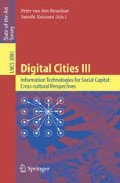Abstract
Today a wide variety of virtual worlds, cities, and gaming environments exist and become part of life of their human inhabitants. However, our understanding of how technology influences the way people can use these virtual places to access information, expertise, to socialize, etc. is very limited. Previous work [1-4] introduced a tool set that generates visualizations of user interaction data to support social navigation, aid designers of virtual worlds in the evaluation and optimization of world content and layout as well as the selection of interaction possibilities, and enables researchers to monitor, study, and research virtual worlds and their evolving communities. This paper applies an advanced version of this tool set to visualize and analyze local and global usage patterns in a virtual learning environment called LinkWorld. Resulting social visualizations have been used to inform a set of netiquette and reporting procedures, to fine tune training material and moderation guidelines, to analyze and report the progress of the LinkWorld project, and to create a ”social compass” for teachers, moderators and students who collaborate in this unique environment.
Access this chapter
Tax calculation will be finalised at checkout
Purchases are for personal use only
Preview
Unable to display preview. Download preview PDF.
References
Börner, K.: Twin Worlds: Augmenting, Evaluating, and Studying Three-Dimensional Digital Cities and Their Evolving Communities. In: Tanabe, M., van den Besselaar, P., Ishida, T. (eds.) Digital Cities II: Computational and Sociological Approaches, pp. 256–269. Springer, Heidelberg (2002)
Börner, K., Lin, Y.-C.: Visualizing Chat Log Data Collected in 3-D Virtual Worlds. In: International Information Visualisation Conference, London, England, pp. 141–146 (2001)
Börner, K., Hazlewood, R., Lin, S.-M.: Visualizing the Spatial and Temporal Distribution of User Interaction Data Collected in Three-Dimensional Virtual Worlds. In: Sixth International Conference on Information Visualization, pp. 25–31. IEEE Press, London (2002)
Börner, K., Penumarthy, S.: Social Diffusion Patterns in Three-Dimensional Virtual Worlds. Information Visualization 2(3), 182–198 (2003)
Bransford, J., Brown, A., Cocking, R.: How People Learn: Brain, Mind, Experience and School, pp. 119–125. National Academy Press, Washington, DC (1999)
Riel, M.: New Designs for Connected Teaching and Learning. White Paper for the U.S. Department of Education Secretary’s Conference on Educational Technology (2000), http://www.gse.uci.edu/mriel/whitepaper/
Talamo, A., Ligorio, B.: Identity in Cyberspace: The Social Construction of Identity through On-line Virtual Interactions. In: First Dialogical Self Conference, pp. 8–16 (2000)
Berge, Z.L.: Facilitating Computer Conferencing: Recommendations from the Field. Educational Technology 35(1), 22–30 (1995)
Jo Kim, A.: Community Building on the Web: Secret Strategies for Successful Online Communities. Peachpit Press, Berkeley (2000)
Borner, K., Corbit, M., DeVarco, B.: Building Blocks for Virtual Worlds. Final Project Report (2003), Available at http://vw.indiana.edu/building-blocks/report.pdf
Preece, J.: Empathic communities: Reaching out across the Web. Interactions 5(2), 32–43 (1998)
Vygotsky, L.S.: Mind in Society: The Development of Higher Psychological Processes. Harvard University Press, Cambridge (1978)
Hogan, D.M., Tudge, J.R.H.: Implications of Vygotsky’s Theory for Peer Learning. In: O’Donnell, A.M., King, A. (eds.) Cognitive Perspectives on Peer Learning, pp. 39–65. Lawrence Erlbaum Associates, Mahwah (1999)
Janssen, J., Meijden, H.v.d., Winkelmolen, M.: Collaborating in a 3D Virtual Environment for Culture and the Arts: Metacognitive Regulation in a 3D CSCL Environment. In: Proceedings of EARLI 2003 - European Association for Research in Learning and Instruction, Padova, Italy (2003)
Author information
Authors and Affiliations
Editor information
Editors and Affiliations
Rights and permissions
Copyright information
© 2005 Springer-Verlag Berlin Heidelberg
About this paper
Cite this paper
Börner, K., Penumarthy, S., DeVarco, B.J., Kerney, C. (2005). Visualizing Social Patterns in Virtual Environments on a Local and Global Scale. In: van den Besselaar, P., Koizumi, S. (eds) Digital Cities III. Information Technologies for Social Capital: Cross-cultural Perspectives. Digital Cities 2003. Lecture Notes in Computer Science, vol 3081. Springer, Berlin, Heidelberg. https://doi.org/10.1007/11407546_19
Download citation
DOI: https://doi.org/10.1007/11407546_19
Publisher Name: Springer, Berlin, Heidelberg
Print ISBN: 978-3-540-25331-0
Online ISBN: 978-3-540-25971-8
eBook Packages: Computer ScienceComputer Science (R0)

